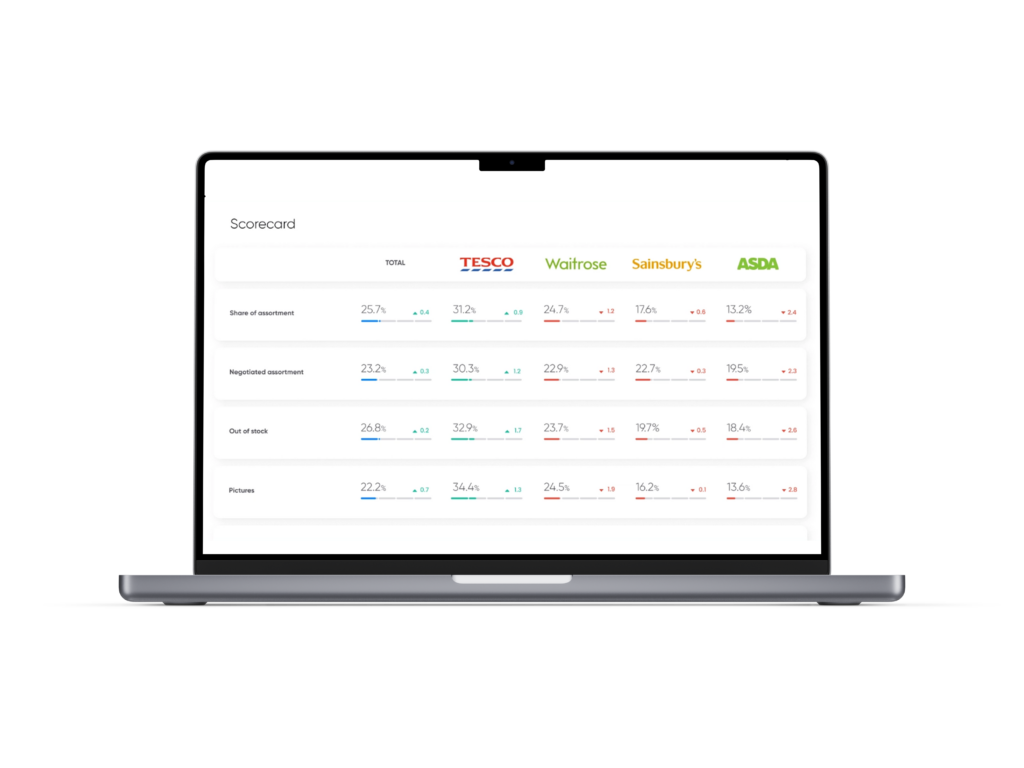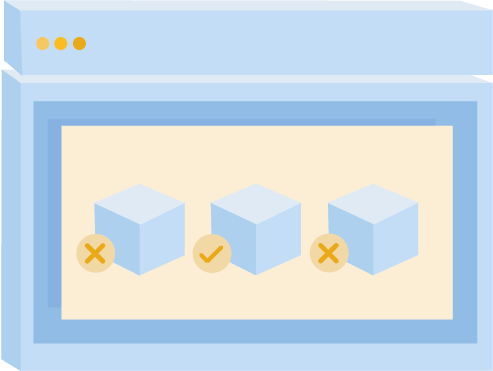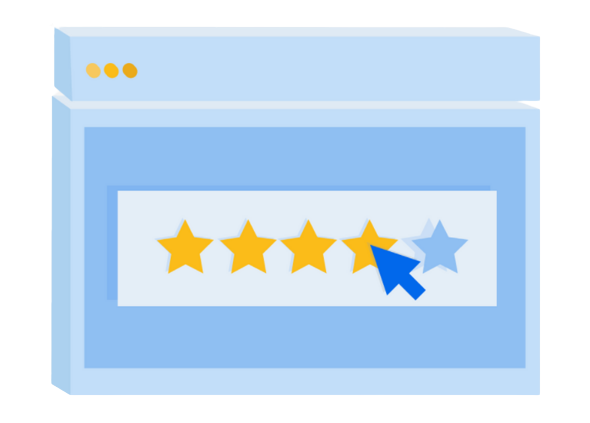4 minute read
Digital shelf analytics are the suite of KPIs that CPGs use to track, measure, improve and predict their product’s digital commerce performance. They usually exist in the form of a platform or an interface that a data analytics solution provider offers.
A good platform is customizable and relieves a manufacturer of the arduous task of manually collecting, cleaning and interpreting data.
Digital shelf performance is analyzed through key KPIs, such as out of stock.
Out of stock (OOS) is foundational because other performance indicators depend on it. If a product isn’t present on the digital shelf it can’t appear in search, any media activations associated with it will be ineffective, and it can’t be sold. Other KPIs that make up the typical suite of digital shelf software are price and promotion, negotiated assortment, share of assortment, distribution, share of voice, image compliance and product title description.
“The objective of digital shelf software is to understand your brand’s performance on the shelf so that you can improve it.”
-Yacine Terki, CEO, Data Impact by NielsenIQ
There are 2 major reasons why CPG digital analytics are essential.
First, their use is already widespread, so to stay competitive they are a must. For instance, if a product starts to lag in search rankings, it’s crucial to know why competitors are pulling ahead. Digital software will alert you to a drop in search averages. Good software will also provide guidance for making changes that will help to regain lost positions. For instance, are product titles and descriptions perfectly aligned with target keywords? Or take ratings. If ratings are slipping the software can help identify patterns in negative reviews. The issue could be a product quality, a consumer trend or some aspect of the service you’re offering.
Digital shelf analytics will alert you when a product is OOS, allowing you to address any supply chain issues or adjusting media spends you may have for that product, thus saving advertising investments.

Second, without a software suite, or a solution provider partner that provides customized digital solutions for your business, it’s basically impossible to stay on top of all the relevant data manually on your own.
With omnichannel activity increasing, a common remark from manufacturers is that they spend an inordinate amount of time cleaning and sorting through data. Some of this data can be collected manually, but the uptake of egrocery is making this proposition untenable for ecommerce managers.
With (potentially) thousands of SKUs and thousands of online stores, keeping up with all the data just isn’t feasible.
Digital shelf software uses data analytics that allows you to not only track, but manage your digital shelf with a minimum of effort. Since the digital shelf is constantly changing, this process is ongoing. New products are introduced, promotions are offered, prices get changed, products get updated and user-generated content is added.

A well-managed digital shelf ensures that your product is being discovered and sold, with the corresponding product description page (PDP) being updated and optimized when necessary-including names, images, description, prices, promotions and more. Location-based data collection is important to ensure that a product’s performance on the digital shelf is being optimized. Sample-based data collection will capture very few of a product’s performance indicators.
Search performance holds particular interest for ecommerce managers. Their common pain points are not knowing how to optimize a product’s visibility per retailer, and not being aware of search results varying from online store to store.
Digital shelf software gives ecomm managers the ability to optimize product pages to correlate to the differing search algorithms of each retailer.
Good digital shelf analytics also give ecommerce managers a true measurement of search performance when those analytics measure search results at every online store as opposed to just a sample of stores. A sample will render results non-representative of the whole.

Also useful to ecomm managers, PIM software offers a simplified way to ensure product images and associated content is correctly displayed. A content tracking feature continually monitors the information in the product pages and signals where they need to be updated, per retailer.
This software can not only monitor but improve the performance of product pages.
This KPI is of particular importance to key account managers (KAMs). Tracking OOS, distribution by store, blockbuster distribution, and online vs. in-store distribution gives KAMs a comprehensive view of assortment and distribution. This tracking answers the pain point of an incorrect view of distribution. A common reason for a misrepresentation of OOS is using a sample of stores to generate the measurement.
Tracking OOS is also useful from a competitive standpoint. When competitors go out of stock, it can be an ideal time to buy paid search on their branded keywords.

Similarly, if your own products go out of stock nationwide, it could be beneficial to adjust any ad spends associated with that product. It’s pointless and expensive to pay to direct customers to a product that they can’t buy.
Minimum Advertised Pricing (or iMAP for Internet MAP) violations can also be monitored by digital shelf software. This is of particular interest to category managers. It offers an instant snapshot of all the stores a product is being listed at a price point lower than the iMAP–if the software employs comprehensive, store-level data analysis.

The category trends that ratings and reviews can reveal are useful to category managers.
Often their understanding of online category movements and assortment changes is limited by an analysis of a sample of stores. Again, an analysis that encompasses all stores can yield powerful insights into competitor strategies, customer trends and product development.

A scorecard is an immediate way for CPGs to see how their products are performing online. It provides instant insight into what aspects of the digital shelf need attention. The sub-optimal aspects of the digital universe that customers encounter when they explore online will be signalled, allowing manufacturers to constantly fine-tune their digital assets to strengthen their position on the shelf.
A customizable scorecard, such as the one Data Impact by NielsenIQ offers, makes the scorecard even more efficient and precise by providing only the information the user needs and chooses.
In conclusion, it’s critical to ensure that data offered by digital shelf software is actionable. A lot of data is available from many different sources today, but if it doesn’t provide clear guidance, and a predictive analysis of the results it will bring, its usefulness will be greatly diminished.
DataImpact undertakes to ensure that the collection and processing of your data, carried out from the www.dataimpact.io site, comply with the Data Protection Act and the RGPD. This processing is necessary for the execution of our services and the internal functioning of our company. For any information on the protection of personal data, you can also consult the site of the Commission Informatique et Liberté www.cnil.fr.
Personal data are collected by : Société par actions simplifiée DataImpact whose registered office is at 39 Rue Lucien Sampaix, 75010 Paris, RCS PARIS 799 367 222 T: +33 (0)1 42 51 87 08
DataImpact is likely to collect personal data about you for the purposes necessary for its activity, whether in terms of recruitment, responding to your requests for information, execution and monitoring of service contracts. Types of data collected: DataImpact only collects data that is strictly necessary for the purposes of its activity. The personal data collected can be the following:
-In the context of a request for information (name, first name, email, telephone, company name).
-As part of a recruitment process: (surname, first name, email, telephone, company name), information on the curriculum vitae (marital status, surname, first name, date and place of birth, nationality, professional background, academic background, hobbies)
-If necessary, connection data including your IP address may be collected for purely statistical purposes.
The personal data collected by DataImpact are those directly given by the person concerned when using the contact form or surfing on the site www.dataimpact.io.
To date, DataImpact does not transfer, nor envisage any transfer of your personal data to a non-European Union member state.
Connection data are kept at the latest within one year after connection to the www.dataimpact.io website.
Data relating to applicants for a post are kept at the latest five years after the last contact, with a view to possible recruitment.
Data of prospects are kept no later than three years after the last contact.
Customer data are kept for the duration of the service contract.
DataImpact ensures that its employees and service providers, subcontractors or hosts, also respect the absolute confidentiality of the information provided to them.
We maintain in-house electronic and organizational security measures in relation to the collection, storage, and communication of data.
DataImpact takes all appropriate measures in order to facilitate the exercise of the rights of its clients regarding their personal data (right of access, rectification, deletion, limitation of processing, portability, to define the fate of its data after death).
The information provided in connection with the exercise of these rights is provided in writing or electronically. On request, the information may be provided orally. All requests should be sent by post to 739 Rue Lucien Sampaix, 75010 Paris or to [email protected].
In accordance with the regulations in force, your request must be signed and accompanied by a photocopy of an identity document bearing your signature and specify the address to which the reply should be sent. A reply will then be sent to you as soon as possible and in any event within one month of receipt of the request.
The new article 40-1 of the French Data Protection Act allows individuals to give instructions regarding the storage, deletion and communication of their data after their death.
You can read the procedure relating to these directives by following the following link: “https://www.cnil.fr/fr/ce-que-change-la-loi-pour-une-republique-numerique-pour-la-protection-des-donneespersonnelles#mortnumerique”.
You are informed that, during your visits to the www.dataimpact.io website, a cookie may, if necessary, be automatically installed on your browser software. A cookie is a small file stored on your computer. As such, it is a block of data that does not allow users to be identified but is used to record information relating to their browsing on the site. Cookies are used, on the one hand, to facilitate your navigation on the site and, on the other hand, for statistical purposes. In order to better know the frequentation of the site, we (mainly) measure the number of pages viewed, visitors, visits, as well as the activity of visitors on our site and their frequency of return.
The parameters of the browser software make it possible to inform about the presence of cookies and possibly to refuse them in the manner described at the following address “http://www.cnil.fr/vos-libertes/vos-traces/les-cookies/”.
You have the right to access, withdraw and modify personal data communicated through cookies under the conditions indicated above.
Article 6 III of the Law of 22 June 2004
Société par action simplifiée DataImpact
39 Rue Lucien Sampaix, 75010 Paris
T: +33 (0)1 42 51 87 08
M: [email protected]
RCS PARIS 799 367 222
Director of publication: Yacine TERKI
Hosting : O2 SWITCH 222 Boulevard Gustave Flaubert 63000 Clermont-Ferrand
The information contained and consultable on this site is provided for information purposes by DataImpact. They can be modified at any time without notice. Under no circumstances does it constitute advice or a service of any kind whatsoever. You assume full responsibility for the use of this site or the information it contains.
DataImpact cannot be held responsible for damages related to the consultation or use of the website by the user. Hypertext links may refer to third party sites over which DataImpact has no control.
DataImpact declines all responsibility for the content of these sites. The use of this service is reserved for strictly personal use. Any reproduction or representation, of all or part of the information, brochures or logos contained on the site, on any medium whatsoever, is prohibited. Failure to comply with this prohibition constitutes an infringement that may result in civil and criminal liability of the counterfeiter.